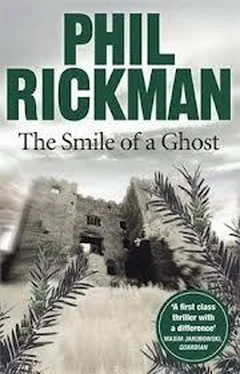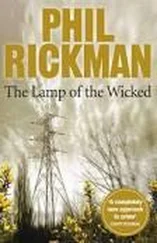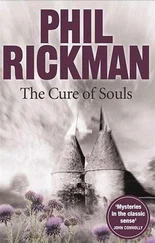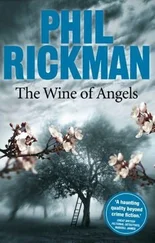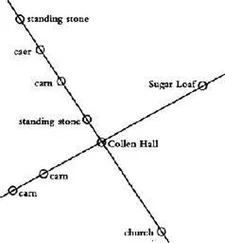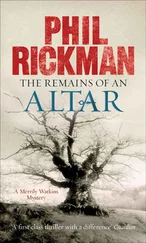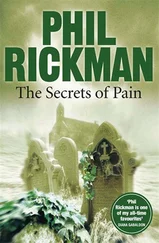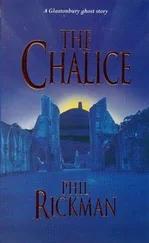‘You’re stupid,’ Jane said. ‘You can’t see what he’s doing to you.’
Merrily standing in the hall, pulling on her coat, Jane in the kitchen doorway, doing the slow head-shake that conveyed superior knowledge.
‘Make this very quick,’ Merrily said.
‘OK. Lol will doubtless confirm the psychology at a future time, but essentially Mumford is a subordinate, officer, right? He never rose beyond sergeant… because he was totally reliable but never had the spark of inspiration that make guys like Bliss – and don’t you ever dare tell Bliss I said this – into a bit of a star.’
‘No worries there.’ Merrily unbolted the front door. ‘Bliss would not believe you’d ever said that.’
‘And now Mumford’s lost Bliss, right?’ Jane came into the hall. ‘He’s floundering. He’s out of his depth. He can’t make decisions. He can’t function without a governor. And so, like, whether he realizes this or not, he’s put you into that essential role…’
‘Jane, that’s—’
‘It’s spot on, vicar, I’m telling you.’
Merrily stepped outside, then turned back. ‘Would you actually like to help?’
Jane’s eyes half-closed. ‘What?’
‘Go on the Net and see if you can find any links between Ludlow and suicide sites and, erm… anything else.’
Jane looked surprised. ‘Yeah, OK.’
‘Thank you, flower.’
‘Any time. I’ll, er… I’ll see you later, then… guv.’
IN THE CITY the rain had stopped, leaving the roads blurred and gleaming, the white-lit restaurant complex in Left Bank Village like an ice palace beside the River Wye, as Merrily drove across Greyfriars Bridge.
This was tourist Hereford, only seven minutes’ drive away from the Plascarreg Estate, where no tourists went except by mistake.
Plascarreg: Welsh for place of the rocks. If what she’d read some months ago in the Hereford Times was still valid, the only rocks here now were crack-cocaine. Plascarreg was flat-pack brick and concrete housing blocks just off the road between Belmont and the Barnchurch Trading Estate, its windowless backs hunched against the west wind and the city. Half-lit in sour sodium, it looked like a vague idea half-thought-out.
Merrily drove in slowly, on full beam. The derelict land opposite had been scheduled for an extension of the Barnchurch site, suspended through lack of investment or perhaps because someone thought derelict land reflected the Plascarreg ethos better than fields.
The second block was three storeys high: flats behind covered walkways. There was a parking area crammed with vehicles, with just one space free if you put two wheels on the kerb. She reversed in, next to an abandoned van with a stack of crumbling bricks under one rear wheel-arch. It would have been stupid to tell herself she wasn’t feeling vulnerable here, but when you’d started out as a curate in a particular area of Merseyside it wasn’t exactly a fear of the unknown.
Mumford hadn’t said whether his sister’s flat was on the ground floor or if there was a stairwell involved. Nobody liked stairwells at night. She started walking along the edge of the roadway, looking up at dull lights behind tight-drawn curtains, edging round puddles, hands in the pockets of her waxed jacket that was hanging open. The air was damp and chilled and sharp, and there seemed to be nobody—
‘Mrs Watkins.’
‘Andy…?’
Moving softly in the shadows, and it was all shadows here, Mumford took her elbow.
‘Should’ve told you on the phone, we en’t going to the flat. It’s just over yere.’
He led her to a low concrete block, separate from the flats: garages, with up-and-over metal doors. Stopping outside one with a thin rim of yellow light around it, pulling up the door with a clang that echoed like machinery in a quarry. The light came from a caged circular ceiling lamp, reflected in an oil-pool on the concrete floor where a car would have been.
‘You better make this bloody quick, Andy.’ A woman moved out of the shadows and pushed in front of Mumford. ‘And remember, you don’t take nothing.’
She was about Merrily’s age, maybe a bit older, with Mumford’s small features surrounded by a lot of dark hair. Her red leather coat was open, showing that she was pregnant.
‘My sister, Angela,’ Mumford said. ‘This is Mrs Watkins.’
‘Merrily.’
‘Good job you didn’t come in your dog collar,’ Angela said. ‘They eat priests on this estate.’
‘They wouldn’t enjoy me,’ Merrily said. ‘I’m more chewy than I look.’
Angela gave her a glance, unsmiling. So maybe this wasn’t the time to offer condolences.
‘Remember what I said,’ Angela said to Mumford. ‘You don’t take nothing away.’ She tossed him a key on a chain. ‘You got half an hour, no more. Lock up when you’ve finished, key through the letter box.’
Angela walked out without looking back. Mumford tried to pull down the door from the inside but the handle was missing.
‘I would say she’s changed.’ He left a gap under the door, so they could get out again. ‘But she en’t.’
At the far end of the garage, the computer sat on a workbench, already switched on, casting a somehow baleful blue light over stacks of cardboard boxes. Mumford nodded at the boxes.
‘Take a look, Mrs Watkins. See what’s left of Robbie Walsh.’
Merrily walked around the oil. There were about a dozen wine boxes from supermarkets. Warily, she opened one.
Books. She pulled one out, large-format: Everyday Life in the Middle Ages, in Pictures . Heraldic symbols in each corner. Once a paperback, its covers had been stiffened with card, the way you did to prolong the life of a book that you really loved, one that was well used, day after day. It flopped open where a page had been torn out, none too carefully, fragments of it still flapping from the spine. The facing page was headed: TRIAL BY ORDEAL.
Mumford prodded a box with his shoe.
‘All his books are yere. Stuff on castles… armour… weapons. Guide books to historic houses people gave him… all off to a boot sale at the weekend – outside of town, they en’t daft.’
‘They’re selling all his stuff?’
‘Need the space. Another baby on the way – boyfriend’s this time, just to prove he can.’
Merrily put the book back in the box and closed the flaps. It felt like pulling a sheet over a body.
‘What happened to Robbie’s father?’
‘He came to the funeral. Not a bad bloke.’ Mumford opened another box, pulled out a turquoise baseball cap, put it on his own head, where it almost fitted. ‘This was always too big for Robbie, see. Poor little devil never realized why folks were laughing. Tried for street cred, never got close.’
‘You’ve got kids, haven’t you?’
‘Two girls. One in New Zealand, one a veterinary nurse, living with a vet down in Newport. They done OK, considering.’ Mumford took off the cap. ‘When you make CID, you’re as good as lost to your family. “Oh Dad, you’re not working again, we never sees you.” “Look,” I’d say, “I’m protecting you and your mother, that’s what I’m doing.” Any old excuse. See this?’
He’d opened up a book he’d evidently been using as a mouse-mat for the computer. The Tudor Household . Something had been scribbled on the front and then scribbled over. Through the top scribble they could still make out crude black letters: Walsh is gay.
‘Jane tells me the word’s become an all-purpose term of abuse now, among kids,’ Merrily said.
‘Abuse,’ Mumford said. ‘Aye.’
‘What are you thinking?’
Mumford reached into the book box, pulled out a paperback with a white and sepia cover: Castles and Moated Sites of Herefordshire . It looked new, except for the brown tape holding the spine together. A pamphlet fell out: South Wye History Project .
Читать дальше
